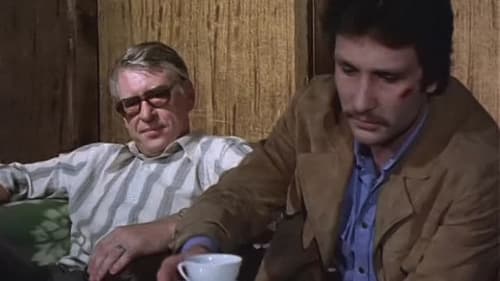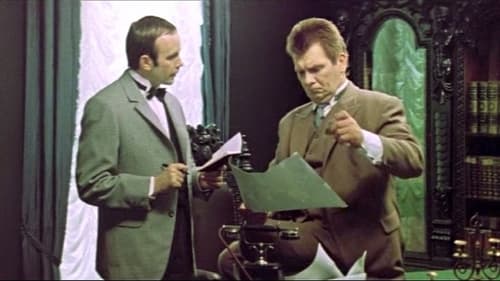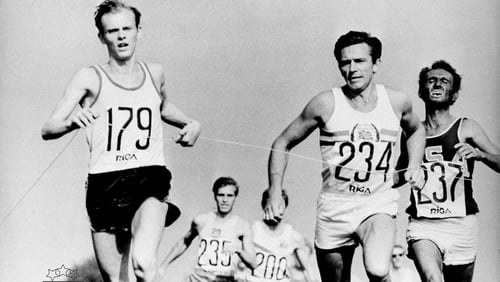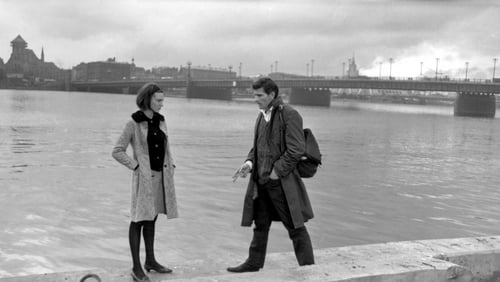Rolands Kalniņš
Nascimento : 1922-05-09,
História
Rolands Kalniņš is a Latvian film director. The last and only Latvian cinema aristocrat. Kalniņš possesses an intelligence of the soul. His films are smart, and the passage of time becomes them; forming new contexts reveals previously unread levels of content and subtext.

Self
What happens in the eyes of a 100-year-old filmmaker? Rolands Kalniņš, one of the great masters of Latvian cinema, sits down to have his photo taken and looks straight in the lens. Kalniņš’ life has spanned an authoritarian regime, a world war, long years under Soviet occupation and censorship, and retirement in independent Latvia. His films have been censored, destroyed, found and restored. But here, like Herz Frank once did with a child, for ten minutes we shall observe the micro-emotions of a man who has dedicated his life to film. Confronted directly by the tool of his trade, the camera. As we face Kalniņš eye to eye, we hear the sounds of his present, and the memories of his past.

Self
A TV documentary about Latvian actor Uldis Pūcītis, featuring fragments from many of his films ("Swap Treader", "Four White Shirts" and others), as well as stories by people who knew him - actors and directors, former lovers and classmates.

Producer

Director

Director
Donats is a modern-day Don Juan juggling the various women in his life seemingly without any consequences, until he falls in love with Agnese. Her husband, Ralfs, turns out to be a formidable opponent.

Producer

Producer
A story about the significance of Goethe’s Faust in the development of Latvian literature, language, publishing, culture and theatre. The video highlights the intersection of world cultures and their mutual development, as well as the courage of the people to break the boundaries of stereotypic attitudes.

Director
A story about the significance of Goethe’s Faust in the development of Latvian literature, language, publishing, culture and theatre. The video highlights the intersection of world cultures and their mutual development, as well as the courage of the people to break the boundaries of stereotypic attitudes.

Producer
A six-year-old boy plots to stop his "sweetheart", a grown-up woman in his pre-World War II Latvian village, from marrying.

Director

Director
Revolution of 1905 in Latvia.

Director
A businessman and a footballer are murdered before an important football match in Prague. Investigation has to be started.

Director
Based on the popular novel of the same title by Vilis Lācis. Latvia, the 1930s. Roberts Līviņš, the son of a dockhand, becomes an architect by his own efforts, thanks to arduous work and talent. But in his relationship with Līvija, the daughter of the rich entrepreneur Ulpe, Roberts realizes that the high society might look down on his common origins as well as his sister Alise, a hairdresser, and her boyfriend Ēriks, an opportunist and former boxer.

Director

Director
A cinematic portrait of the actress and performer Vija Armane.

Director
Relations of two sportsmen who often forget that they are not the only ones in the stadium.

Director
The wonderful power of folk songs and dances that helps to notice the beauty of the world and human relations.

Director
The colourful musical comedy Maritime Climates could have been a triumph of smart political satire – if people in positions of power hadn’t got worried by the rushes they saw, which lead them to terminate the production. In 1992, Rolands Kalniņš made this edit of the remaining material – an elegy to lost hopes and illusions.

Director
Latvia in the 1920s. The enterprising Edgars Ceplis establishes a company to produce bricks from Latvian clay for export. Many are involved in his project, hoping for the huge profits the venture promises. Ceplis soon becomes infatuated with his office typist Austra Zīle and starts neglecting the business...

Director
The hard work plays an important role in the personal growth of a runner.

Second Assistant Director
Land surveyors arrive in two parishes to measure and redistribute manor land. The rivalry between both feoffees for land and woman begins.

Director
Cezars Kalnins, portrayed by "Latvian Harrison Ford” Uldis Pucitis, installs telephones by day and composes pop songs by night. The puritan Soviet censorship deems Cezars’s lyrics "unsuitable and frivolous” and "unfit for the Soviet youth”. In fact, it can be argued that this assessment matches the opinion of the Soviet cinema authorities in regard to this film as a whole, since "Four White Shirts” was immediately banned and released in cinemas only in 1986. The creative boldness and stubbornness, evident in both Cezars’s bitingly ironic verses and the film’s unconventional narrative structure and fresh, new-wave-inspired mode of expression, turned out to be equally problematic for the hero and for the film itself, as well as for its director whose representation of the actual mechanisms of Soviet censorship ended up too realistic for his own good.

Director
During World War II three best friends are mobilized into the Waffen-SS Latvian Legion. Years later their fates continue to intertwine, as memories of war loom in back of their minds.

Director
A story about children helping the Soviet Army during the war.

Director
A film about combating venereal diseases.

Director

Director
A political film based in Latvian countryside in 1947.

Assistant Director

Co-Director

Director
Head of the CID and his colleagues are investigating a serious crime but the main witnesses are of no help.











